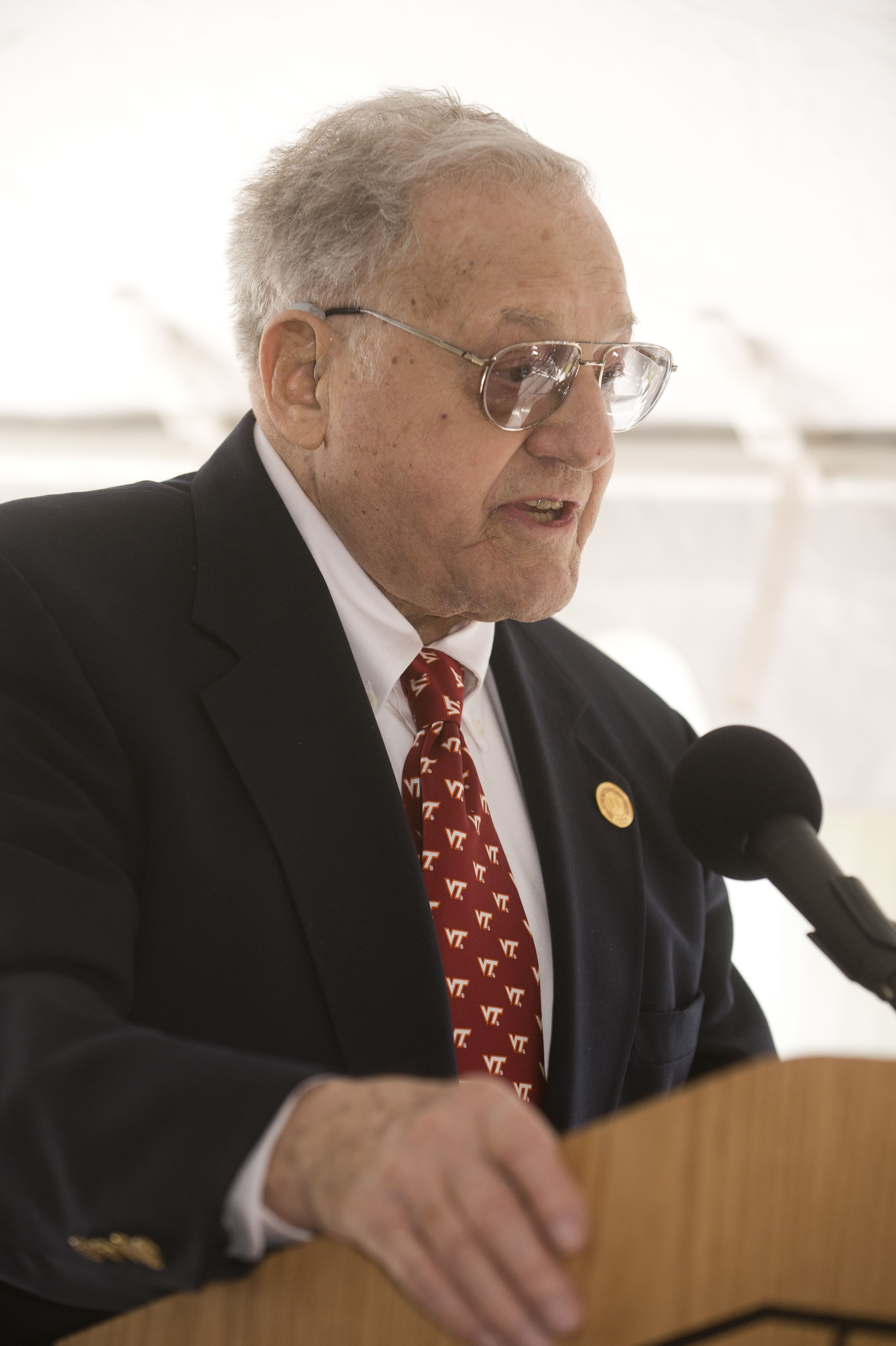Virginia Tech opens new foundry for students in engineering, art, and architecture

Virginia Tech’s College of Engineering is continuing its tradition of hands-on, minds-on education with the newly opened Kroehling Advanced Materials Foundry, a metal casting facility located just off campus on Plantation Road.
The 4,500-square-foot, $1.7 million facility includes a 125-kilowatt induction furnace capable of melting aluminum, copper and bronze, iron and steel, various mold making equipment including no-bake and ceramic shell, a rapid prototype, and other high-tech equipment that students likely will find themselves using upon entry into the metal casting and related industries.
The facility, hosting classes for undergraduate and graduate students since January, was dedicated April 5 with an open house. On hand for the event were John H. Kroehling, a decorated World War II veteran and 1948 graduate of the College of Engineering, and his wife, Joan.
Kroehling, a member of the advisory board for Virginia Tech Materials and Sciences Engineering Department, provided the initial funds of $500,000 for the foundry project, overseen by the Virginia Tech Foundry Institute for Research and Education (VT-FIRE) program. The group’s mission is to support student interest in the area of foundry science and the metal casting industry.
“When I was sitting in advisory committee meetings in [Materials Science and Engineering], I could not really contribute much to what they were doing. None of my experience seemed to be of any help there,” Kroehling said, adding that his major was in ceramics engineering program, since merged into the materials science and engineering program, at then-Virginia Polytechnic Institute.
But Kroehling saw a need. And he took action. “The VT-FIRE [program] seemed to be slow going, it wasn’t moving. They needed a building,” he said. At the time, Virginia Tech had one laboratory in the basement of Whittemore Hall in which small aluminum castings were made in an introductory-level course. The Kroehling’s initial funding of $500,000 for a new foundry kick-started corporate donations of money and in-kind contributions of equipment. Construction began in spring 2010. “It was just the seed money, but from then on, it started moving fast,” Kroehling said.
Kroehling already was a major contributor to Virginia Tech through scholarships and fellowships to the College of Engineering and the university’s Department of Statistics, where his son graduated from in the early 1980s. “I wanted to give back to the university for the education I received, and our son received and our granddaughter is receiving,” said Kroehling, who spent 20 years at DuPont, working in metal foundries and the refractories industry, and also founded his own company, J.H. Kroehling Associates Inc., which he still operates. (Kroehling has a granddaughter who is now a freshman on an engineering track at Virginia Tech.)
In addition to College of Engineering classes for the departments of Materials and Science Engineering, Engineering Education, Industrial Systems and Engineering, and Mechanical Engineering, the facility also will serve students in the College of Architecture and Urban Studies’ School of Visual Arts and the Industrial Design program.
“In the College of Engineering, we pride ourselves in our hands-on, minds-on education, you see that in all of our literature, it is very real and it goes back many decades, as any alumnus can remember,” said Richard C. Benson, dean of the Virginia Tech College of Engineering. “What our students do in design and manufacturing, just making things, is just really quite rare. … There are a few small foundry operations to be found at other schools, but there’s nothing to compare to the scale of what we have here.”
Added Kroehling, “I think it will help this country to do more casting, very high-tech casting, and this foundry is very state of the art.”
Among the engineering faculty leading in the foundry’s inception was Bob Hendricks, a professor with the Department of Materials Sciences and Engineering, and Paul Huffman Jr., an adjunct instructor within the same department who also is president of Roanoke, Va.-based Dominion Metallurgical Inc. Huffman is an alumnus of the college.
Hendricks said the equipment – induction furnace, casting area, mold-making equipment and the like -- used in the foundry match those of high-tech companies. It’s also Earth friendly, with strong controls on fumes and other pollutants, and a computer-monitored lighting system that will conserve power usage.
In addition to Materials and Sciences Engineering Departments’ advisory board, Kroehling serves on the College of Engineering’s Committee of 100 and is a member of the college’s Academy of Engineering Excellence. The Kroehlings also have donated money to fund two scholarships at Virginia Tech, and made a deferred gift to the university to establish two John H. Kroehling Scholarships.




